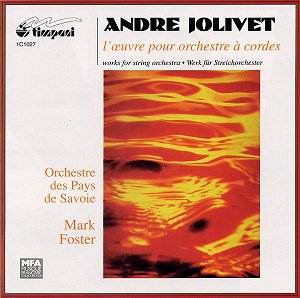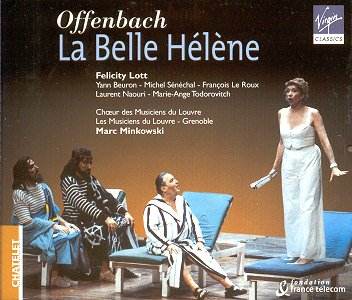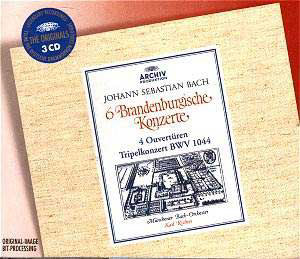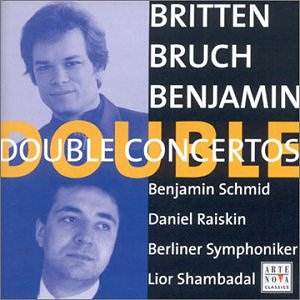 Composer: André Jolivet
Composer: André Jolivet
Works: Symphonie pour cordes (1961), Yin-Yang (1973), Adagio (1960), La Flèche du Temps (1973), Andante (1935)
Performers: Orchestre des Pays de Savoie, cond. Mark Foster
Recording: Dôme-Théâtre, Albertville, 23-26 September 1994
Label: TIMPANI 1C1027
André Jolivet’s music, often eclipsed by that of contemporaries like Messiaen, emerges in this recording as a vibrant testament to mid-20th century French composition. This collection encapsulates his journey from the early, introspective Andante to the more complex and demanding works of his later years, showcasing a composer who navigated the turbulent waters of modernism with a distinct voice. The historical context of these compositions reveals a composer grappling with existential themes through a lens influenced by both primitive rhythms and the intricate textures of contemporary harmonic language.
The Orchestre des Pays de Savoie under Mark Foster’s baton delivers a performance that is both sensitive and robust, capturing the essence of Jolivet’s unique sound world. The Symphonie pour cordes presents a formidable challenge, characterized by dense polyphony and high harmonic temperatures. The orchestra’s commitment shines, particularly in the way they articulate the work’s aggressive motifs and the more contemplative moments that punctuate its structure. Jolivet’s writing for strings demands a level of technical prowess that the ensemble largely fulfills, although the performance feels more akin to an ensemble of soloists than a cohesive orchestral body, which lends a certain transparency to the intricate lines but occasionally sacrifices the lushness one might expect from a full string orchestra.
In the Adagio of 1960, inspired by El Greco’s emotive painting, the performers achieve a remarkable depth of expression. The use of long, flowing lines juxtaposed with stark harmonic shifts creates an ethereal quality that is hauntingly beautiful. Here, Foster expertly balances the orchestra’s dynamics, allowing the music’s architecture to unfold naturally. This contrasts sharply with the later works, particularly Yin-Yang and La Flèche du Temps, which explore contrasting emotional landscapes. The former, noted for its serene and spiritual qualities, is marked by a textural complexity that unfolds through eleven distinct parts, challenging the performers to maintain clarity amidst the intricate layers. The latter, in contrast, dives into darker territories, with abrasive passages that call for a visceral engagement from the players.
Recording quality is commendable; the clarity of the sound allows for a detailed appreciation of Jolivet’s intricate textures. The balance is well-managed, providing an almost chamber-like quality to the ensemble, which is particularly beneficial for works where every voice must be heard distinctly. The engineering captures the resonances of the Dôme-Théâtre beautifully, allowing the rich timbres of the strings to bloom without overwhelming the listener.
This recording serves as a valuable contribution to the catalog of Jolivet’s works. It not only enriches our understanding of his musical language but also highlights the orchestral challenges inherent in his compositions. The performance by the Orchestre des Pays de Savoie, while not without its moments of uncertainty, ultimately resonates with an authenticity and dedication that brings Jolivet’s complex vision to life. Strongly recommended for those seeking to explore the depths of 20th-century French music, this collection is a vital addition to the discerning listener’s library.



